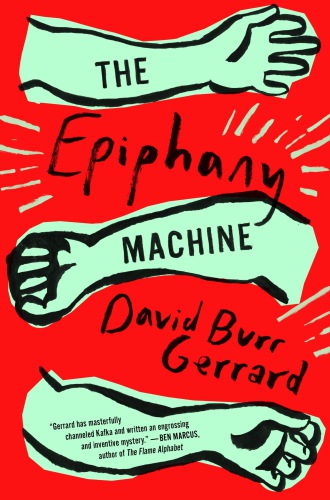
The Epiphany Machine
کتاب های مرتبط
- اطلاعات
- نقد و بررسی
- دیدگاه کاربران
نقد و بررسی

Starred review from May 8, 2017
Gerrard’s (Short Century) superb second novel has an exhilarating premise: what if there were a machine that could reveal your deepest secret—the uncomfortable truth about yourself you choose to overlook—by tattooing it on your forearm? The novel is composed of rules about the machine, testimonials, descriptions of quasiprophetic operator Adam Lyons, and excerpts from books by the mysterious Steven Merdula about the machine—but primarily the book is Venter Lowood’s memoir about coming of age in New York at the turn of the 21st century. Lowood contemplates and discusses American political history from the American Revolution to the War on Terror, raising questions about privacy, destiny, responsibility, and truth. Gerrard’s deft command of character, humor, and metaphor keep this intricate, philosophical novel fast-moving, poignant, and fun. In snarky banter, Venter and his best friend Ismail Ahmed communicate their deep affection and their playful rivalry, and in Venter’s tense conversations with his father (whose forearm reads “SHOULD NEVER BECOME A FATHER”) readers can see the painful legacy of the Lowoods’ encounters with Lyons and the machine. The figurative language is inventive and insightful: “Life is an extended freefall. An epiphany may help you see better.... Rather than a meaningless blur, you will see rocks and trees and lizards. An epiphany is not a parachute.” This is a wildly charming, morally serious bildungsroman with the rare potential to change the way readers think.

May 15, 2017
A young man's life is upended by a device that purports to tattoo a description of your true self on your arm.Venter, the narrator of Gerrard's second novel (Short Century, 2014), has an unfortunate judgment tattooed on his arm: "Dependent on the Opinion of Others." That message has been delivered via the epiphany machine, a sewing machine-like device that its cryptic, charismatic, oft-stoned owner, Adam, has been deploying in a Manhattan apartment since the 1960s. The machine has been alternately embraced for its soothsaying (John Lennon got a tattoo) and mocked as cultic snake oil, but Venter has personal reasons to take it seriously. After all, is he wrong to read meanings in his father's tattoo ("Should Never Become a Father") or his vanished mother's ("Abandons What Matters Most")? To investigate mom's disappearance, Venter becomes an assistant to Adam, gathering personal testimonials from tattoo recipients while he finishes high school and starts college. As the plot enters the 21st century, Gerrard picks up storylines involving 9/11, the war on terror, and online algorithms that seem to know a little too much about us. That range makes the novel feel somewhat uncentered, a problem exacerbated by Gerrard's multitude of storytelling modes (testimonials, news reports, book excerpts). When it sticks to Venter's perspective, though, it's an affecting exploration of fate and the clash of our private and public selves. How doomed is he to be acquiescent because of his tattoo? Are our lives improved by knowing our essence clearly, even if it's not exactly positive? Does that essence predict criminality? (A "Does Not Understand Boundaries" tattoo correlates to pedophilia.) How much trust do we put in one person's (or machine's) judgment? Gerrard goes about this a little messily, but he's ambitiously wrestling in the muck of big questions. A pleasurably speculative yarn about family and ethics.
COPYRIGHT(2017) Kirkus Reviews, ALL RIGHTS RESERVED.

May 1, 2017
Venter Lowood never knew his mother because she cast her lot with Adam Lyon and his diabolical Epiphany Machine, and then disappeared. All kinds of people come to Adam's shabby New York apartment hoping for enlightenment via an epiphany tattoo brutally inked into their forearms by an odd contraption resembling a sewing machine. In this many-stranded, Kafkaesque, alternative-reality bildungsroman and satire of American dysfunction, private and political, Gerrard spins suspect tales about the origins and uses of the machine, involving an enslaved blacksmith during the American Revolution, John Lennon, and the Internet. Once viewed as the shameful marks of a cult, these oracular tattoos describing the true nature of their bearers become hip and desirable even as they do as much harm as good. After bumbling Venter follows his mother's path and becomes Adam's assistant, both he and his friend Ismail, aspiring writers, get tattoos. While Venter's is personally challenging, Ismail's is a dire liability in the wake of 9/11. A rampaging inquiry into questions of self, society, and justice, Gerrard's novel is boldly imagined, droll, and righteously incisive.(Reprinted with permission of Booklist, copyright 2017, American Library Association.)

























دیدگاه کاربران